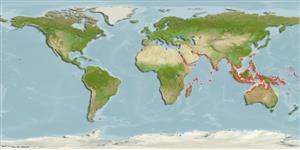Elasmobranchii (haaien en roggen) (sharks and rays) >
Myliobatiformes (Stingrays) >
Dasyatidae (Stingrays) > Urogymninae
Etymology: Pateobatis: Combination of Latin 'pateo' for 'lie open, be exposed' and 'batis' for skate, ray or flatfish; referring to the eclectic nature of members of this group..
More on author: Blyth.
Issue
Former synonym of Pateobatis uarnacoides (both previously under Himantura), but was resurrected as valid species (Ref. 114953).
Environment: milieu / climate zone / depth range / distribution range
Ecologie
marien; brak water benthopelagisch; amfidroom (Ref. 51243); diepte ? - 30 m (Ref. 9840). Tropical
Northern Indian Ocean: Pakistan to Myanmar (but range needs refinement).
Grootte / Gewicht / Leeftijd
Maturity: Lm ? range ? - ? cm
Max length : 84.0 cm WD mannelijk / geslacht onbekend; (Ref. 121648); 112.0 cm WD (female); max. gepubliceerd gewicht: 21.1 kg (Ref. 121648); max. gepubliceerd gewicht: 21.1 kg
Enters estuaries (Ref. 4832). Found mainly on muddy bottoms to at least 40 m depth. Most likely to feed on small crustaceans (Ref. 114953). Ovoviviparous (Ref. 50449). Feeds on bottom-living invertebrates (Ref. 68964).
Levenscyclus en paargedrag
Maturiteit | Voortplanting | Paaien | Eieren | Fecunditeit | Larven
Exhibit ovoviparity (aplacental viviparity), with embryos feeding initially on yolk, then receiving additional nourishment from the mother by indirect absorption of uterine fluid enriched with mucus, fat or protein through specialised structures (Ref. 50449). Distinct pairing with embrace (Ref. 205).
Talwar, P.K. and A.G. Jhingran, 1991. Inland fishes of India and adjacent countries. vol 1. A.A. Balkema, Rotterdam. i-liv + 1-541, 1 map (Ref. 4832)
Status op de Rode Lijst van het IUCN (Ref. 130435)
Gevaar voor de mens
Venomous
Gebruik door de mens
Visserij: commercieel
Meer informatie
ReferentiesAquacultuurAquacultuurprofielKweeklijnenGeneticaElectrophoresesErfelijkheidZiektesVerwerkingNutrientsMassaconversie
Tools
Speciale rapporten
Download XML
Internetbronnen
Estimates based on models
Preferred temperature (Ref.
123201): 26.6 - 29.3, mean 28.6 °C (based on 2266 cells).
Fylogenetische diversiteitsindex (Ref.
82804): PD
50 = 0.5312 [Uniqueness, from 0.5 = low to 2.0 = high].
Bayesian length-weight: a=0.00832 (0.00366 - 0.01891), b=3.10 (2.90 - 3.30), in cm total length, based on LWR estimates for this (Sub)family-body shape (Ref.
93245).
Trofisch niveau (Ref.
69278): 3.5 ±0.5 se; based on size and trophs of closest relatives
Weerstandsvermogen (Ref.
120179): laag, minimale populatieverdubbelingstijd 4,5-14 jaar (Assuming fecundity<100).
Fishing Vulnerability (Ref.
59153): Very high vulnerability (90 of 100).
